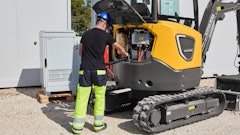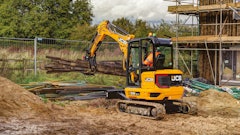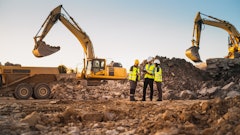
JCB has announced plans to invest $245 million (£150 million) to expand its operations in Staffordshire, UK and create an additional 2,500 jobs by 2018, which will in turn add a further 7,500 jobs in the UK supply chain. A recent Oxford Economics study concluded that for every one JCB job, there are three others in the UK supply chain.
To mark the announcement, the Chancellor of the Exchequer, the Rt. Hon. George Osborne MP, visited JCB’s backhoe-loader factory in Rocester, Staffordshire. His visit came the day after he delivered his Autumn Statement, in which he committed government funding to unlock economic growth in Staffordshire with a major road improvement project on the A50 trunk road in Uttoxeter.
The Chancellor was hosted by JCB Chairman, Lord Bamford, who confirmed the five-year investment plans for Staffordshire as part of a wider global growth strategy to expand sales and increase market share.
Subject to planning consent from relevant Staffordshire authorities, the $245 million plans represent the single largest investment in JCB’s history. They include:
- A brand-new, purpose-built 350,000-sq.-ft. factory for JCB Cab Systems in Beamhurst, near Uttoxeter, to replace the current smaller facility in Rugeley. It will also enable JCB to in-source production of cabs currently made by third-party suppliers in Europe.
- Expansion of JCB’s production operations in Rocester with an additional 126,000 sq. ft. of manufacturing space to increase hydraulic cylinder production.
- A brand-new, purpose-built 220,000-sq-ft.-factory on the Harewood Industrial Estate in Cheadle, Staffordshire to expand existing JCB Earthmovers and JCB Compact Products operations, allowing JCB Utility Products to relocate to this site from the current smaller factory elsewhere in the town.
- Relocation of the existing JCB Finance and JCB Insurance offices in Rocester to new purpose-designed, high-quality office accommodation at nearby Harper Meadow in Denstone.
- A new in-house training facility for JCB staff, to be run in conjunction with key universities to support apprenticeship and graduate training programs.
“The Chancellor’s announcement of the major A50 road improvement project is good news for businesses in this area,” said Lord Bamford. “It allows companies like JCB to plan ahead with confidence, knowing that the road network will not constrain business growth and future investment.
“Our plan to create 2,500 high-quality manufacturing jobs locally is clear evidence of the important link between infrastructure improvement and job creation. The Chancellor’s decision to invest in the regional infrastructure means JCB can continue to invest locally, which is good for Staffordshire and good for Britain, especially given the wider benefits to our UK supply chain.”
The projected growth in machine output from Staffordshire factories will be supported by an increase in production of components from factories elsewhere in the UK, including engines from JCB Power Systems in Foston, Derbyshire, and axles and gearboxes from JCB Transmissions in Wrexham, North Wales.
During his visit to JCB, the chancellor met with senior company executives and was introduced to employees in the backhoe loader factory, including welding operatives in the manufacturing cells and assembly line operatives on the production line where the iconic yellow JCB diggers are assembled.
Osborne concluded his visit with a short speech to employees, to congratulate them on reaching a key milestone in JCB’s history by selling its one-millionth machine during 2013. Over half a million of these were backhoe-loaders, an innovative machine range that celebrates its 60th birthday this year.
He also welcomed the fact that JCB – a global company with 11 plants in the UK and 11 plants overseas – is committed to further investment in the UK and is expected to pledge government support to help drive business and economic growth in the regions through investment in infrastructure projects, such as the A50 scheme.



























